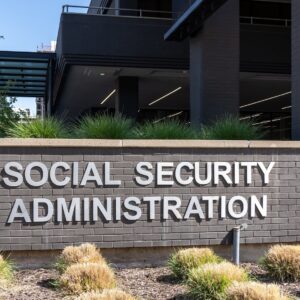
Scammers love to impersonate government and law enforcement officials, from the FBI to the U.S. Marshals Service to Medicare and other health insurance programs. There’s a good reason for this: Most Americans use government services at some point, and many may be apt to trust, or at least engage with, someone claiming to be from a well-known agency. Plus, the threat of losing benefits or being targeted by legal action is especially compelling when it comes from a government representative, and victims may be more likely to comply with scammers’ demands.
It’s no surprise, then, that schemes currently making the rounds involve Social Security and Veterans Affairs benefits, according to warnings from the Social Security Administration and the Department of Veterans Affairs.
Social Security account suspension scam
Social Security numbers are often part of identity theft, so it would be alarming to receive a notice that yours has been involved in criminal activity. Scammers are counting on this when impersonating the SSA’s Office of the Inspector General (OIG) and trying to trick you into actually giving up your SSN and other sensitive information.
Here’s how the scheme works: Fraudsters are sending emails with the subject line “Alert: Social Security Account Issues Detected” and including attachments on letterhead that looks like it comes from the OIG. The notice contains official-seeming information, such as a reference number and case ID, and states that your SSN will be suspended within 24 hours due to fraudulent activity on your account. The letter also says that criminal charges have been filed and even includes the statutes that have supposedly been violated.
Recipients are instructed to call the number listed to “respond to these allegations,” but the person on the other end is a scammer impersonating an SSA employee. They will try to exploit your fear and confusion to collect personal and financial information from you.
VA benefits overpayment scam
Scammers are also contacting veterans and military family members who receive VA benefits, claiming that said benefits have been overpaid and pressuring targets to pay back the money owed.
According to the VA’s advisory, fraudsters are using fake VA letterhead and logos on notices sent by mail and email as well as spoofing real VA phone numbers. They are trying to convince beneficiaries to make payments immediately using methods like wire transfers, cryptocurrency, prepaid debit cards, and gift cards, and they may also request sensitive information your VA login or bank account credentials.
While VA benefits could legitimately be overpaid, the VA won’t contact you and demand money—especially via bitcoin and other unrecoverable methods. Nor should you ever have to pay an upfront fee for assistance with managing VA debts and claims (the VA does this for free).
If you do actually owe money, you will be able to find more information on repayment through your official VA.gov account. Always verify through official VA channels, such as VA.gov and the VA’s Debt Management Center (800-827-0648). Never rely solely on unsolicited communication, and never give out your password, SSN, or financial information.
Government agencies don’t send threatening notices via email (or by any other means), so if you receive a scary letter out of the blue, don’t act without investigating. Always contact the agency via the information found on its website—don’t call or text any number provided in these notices.